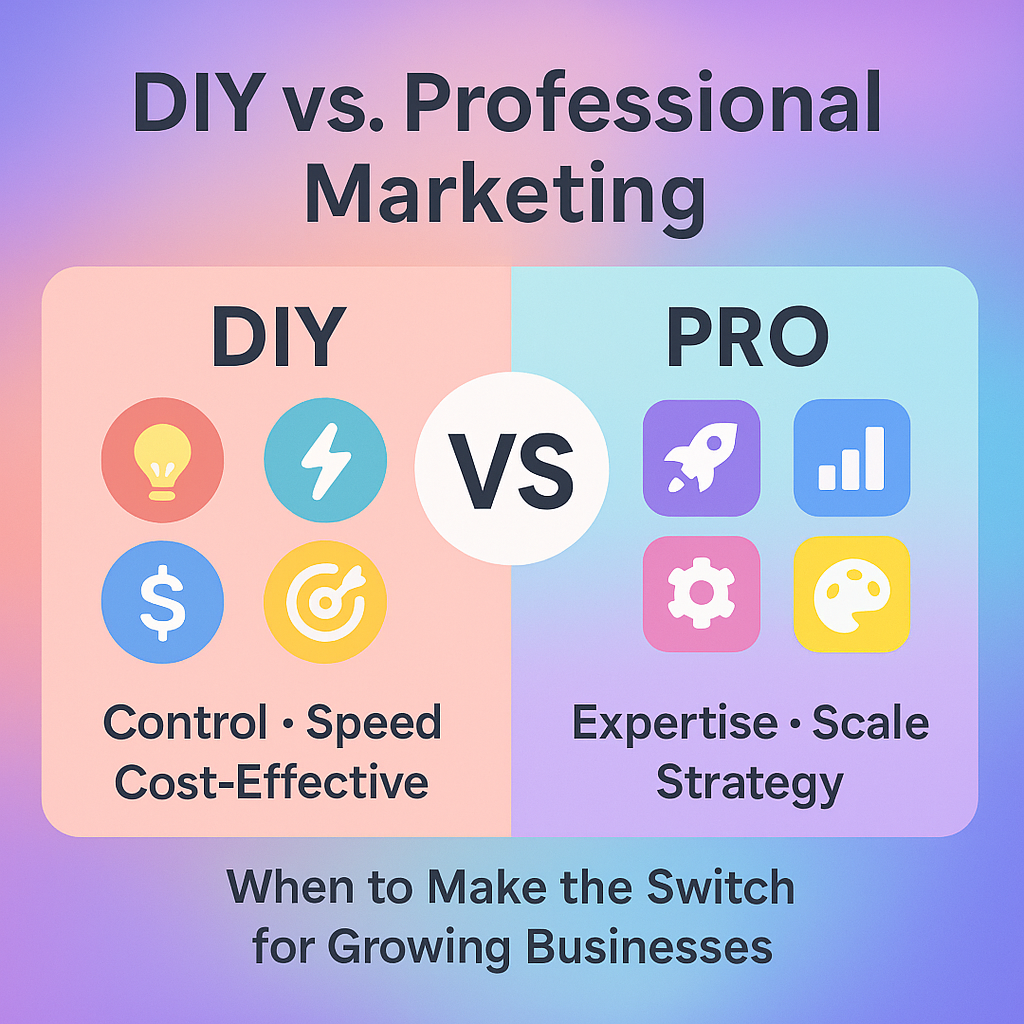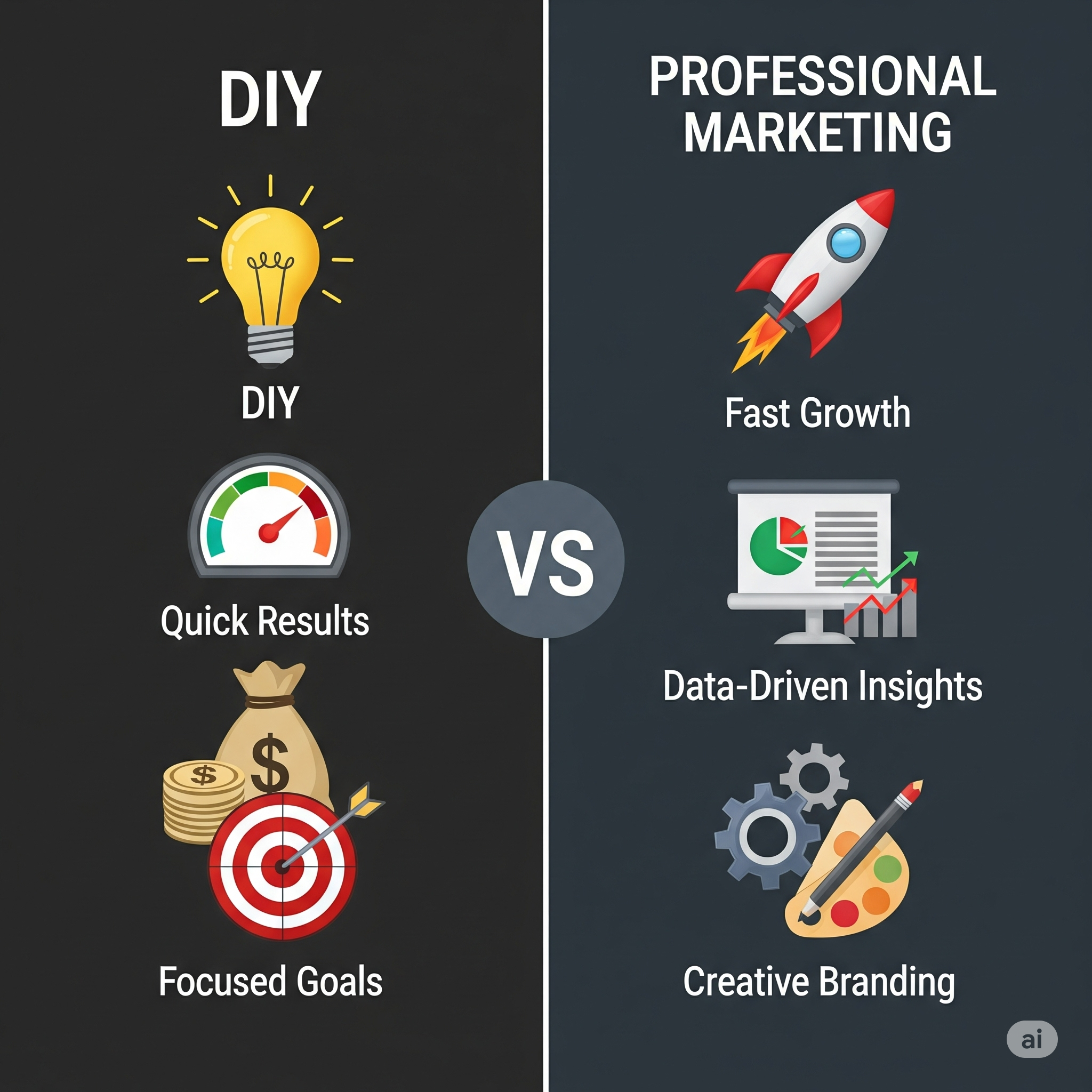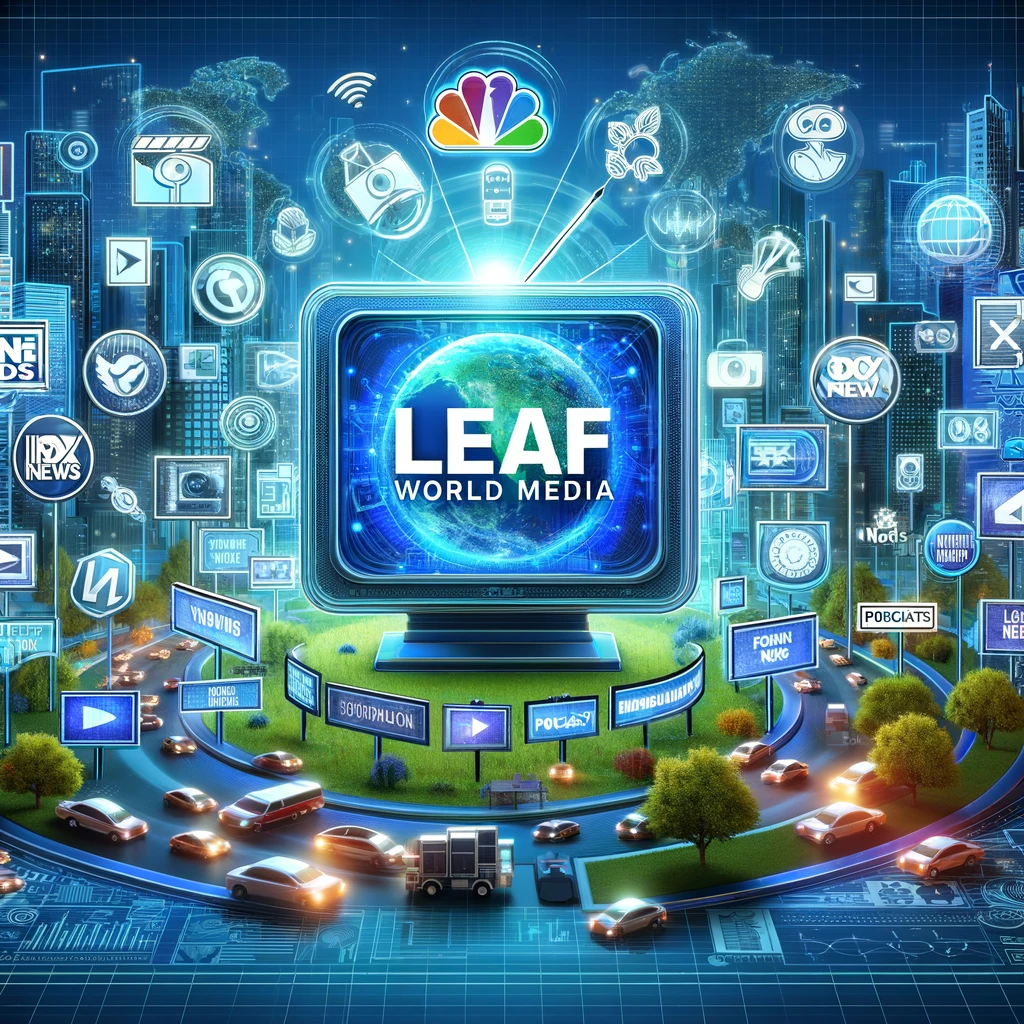Key Points
- DIY marketing eventually reaches a plateau where the lack of specialized knowledge inhibits business growth and competitive edge.
- The real cost of DIY marketing isn’t just about money saved—it also includes opportunity cost, time taken away from core business operations, and inefficient learning curves.
- Professional marketing agencies offer strategic advantages like expertise across multiple channels, access to premium tools, and data-driven approaches.
- Marketing Evolution can change your growth path by implementing personalized marketing strategies that scale with your business needs.
- A mixed approach that combines DIY elements with professional expertise often provides the best ROI for growing businesses.
Every business gets to a crucial turning point where DIY marketing no longer provides the growth needed to remain competitive. If you’re reading this, you might be nearing—or have already reached—that point.
Moving from doing all your marketing in-house to working with professionals isn’t just an additional business cost—it’s a strategic growth decision that can greatly speed up your company’s progress. Marketing Evolution assists businesses in making this transition with tailored strategies that balance resource efficiency with maximum market impact.
Why DIY Marketing Often Plateaus

DIY marketing is a great tool when you’re just starting out. You have a deep understanding of your product, you’re excited about your mission, and no one can represent your brand better than you. This organic strategy often helps you form real relationships with your first customers and helps you get your foot in the door in your market.
But, as your business grows, so does the complexity of the marketing landscape. What began as simple social media posts and the occasional email morphs into the need for a comprehensive content strategy, advanced SEO, paid advertising campaigns, intricate analytics, competitive positioning, and so much more. The jack-of-all-trades approach that worked for you in the beginning becomes the very thing that limits your growth.
A lot of business owners find out about this limit when they see decreasing returns despite increasing their marketing efforts. The DIY strategies that once generated exciting growth now barely maintain the status quo, and the platforms and techniques that used to work start delivering diminishing results. To navigate these challenges, some businesses are partnering with agencies to optimize their marketing strategies and achieve sustainable growth.
How to Know if Your Business Needs More Than DIY Marketing
It’s not always easy to tell when your business has outgrown your DIY marketing approach. The shift usually happens slowly, with small signs that your marketing efforts aren’t keeping up with your business’s growth. If you can spot these signs early, you can avoid slowing down your growth and missing out on opportunities.
You’re Not Consistent With Your Marketing
If you find yourself marketing your business only when you have time, rather than making it a continuous strategic priority, it’s a sign that you could use some professional help. Inconsistent posting schedules, irregular email campaigns, and sporadic content creation all undermine your brand recognition and engagement with your audience. A professional agency will implement a structured marketing calendar and execute it consistently, building momentum over time. Consider how to partner with LeafWorldMedia to enhance your marketing strategy.
Often, this inconsistency happens not because of a lack of commitment, but because of the natural bandwidth limitations that come with growing businesses. As other operational demands increase, marketing is often the first casualty of your limited time.
Marketing Tasks are Taking Up Too Much of Your Time
If you’re finding that you’re spending too much time on basic marketing tasks and not enough on business development and strategic planning, it may be time to think about getting some professional help. A lot of business owners end up spending their evenings and weekends doing marketing tasks that could be done more efficiently and effectively by a professional.
As your business grows, the time you spend on these tasks becomes a significant issue. The hours you spend struggling with social media scheduling tools or dealing with email deliverability problems are hours you could have spent on high-level growth initiatives that only you can handle.
Efforts Increase But Results Don’t
The most obvious sign that you’re in over your head with DIY marketing is when you’re putting more and more into it but getting less and less out of it. This is what happens when you’ve maxed out your marketing know-how. You’re doing everything right, but you’ve hit a wall because you’re only as good as what you know. This is where the pros come in. They have the expertise to take you beyond your current level.
Stagnation usually occurs because the marketing landscape is always changing. Strategies that were effective six months ago may not work today. It becomes increasingly hard to keep up with these changes without a dedicated marketing team to keep an eye on industry trends.
Your Rivals Are Getting Ahead
If businesses of a similar size and product or service range are consistently more visible, engaging and successful in the marketplace than your own, it usually means they have invested in professional marketing services while you are still managing your marketing internally. This professional edge grows over time, making the gap harder and harder to bridge with just your own marketing efforts.
This competitive disadvantage becomes particularly apparent in digital marketing channels where sophisticated targeting, testing, and optimization strategies can dramatically improve performance. While your competitors leverage professional expertise to refine their approaches, DIY efforts typically lack the sophisticated tools and methodologies to keep pace. For instance, understanding the best Facebook and Google Ads tips can be crucial for staying ahead.
You’re Lacking the Expertise
Marketing has become more and more specialized, with different skills needed for different channels and strategies. Not many business owners have expertise in SEO, PPC advertising, social media algorithms, email marketing automation, content strategy, conversion rate optimization, and analytics—all of which are critical components of effective modern marketing.
If you’re aware that your marketing skills are lacking and that this is holding your business back, it’s a sure sign that you would benefit from professional help. Professional agencies have experts in all of these areas who keep up to date with the latest techniques and can use advanced strategies that are beyond the capabilities of most DIY marketers.
The Hidden Expenses of DIY Marketing
DIY marketing may seem cost-effective at first glance, but the hidden costs often exceed the apparent savings. Understanding these hidden costs can help business owners make better decisions about their marketing investments.
Time Spent Away from Core Business Activities
The biggest unseen expense of DIY marketing may be the cost of your time. Every hour spent managing social media posts, creating graphics, or fixing website problems is an hour not spent on product development, building client relationships, or strategic planning. As a business owner or executive, your time is very valuable—often worth hundreds of dollars per hour when factored against your contribution to generating revenue. For insights on optimizing your time, consider exploring partnering with a marketing agency to handle these tasks.
As your business grows, this time drain becomes a significant issue. What starts as a manageable few hours a week can quickly turn into a part-time or even full-time commitment. This pulls you away from the core activities that drive business growth and where your unique expertise adds the most value.
The Cost of Doing It Yourself
The difference in results between a professional and an amateur campaign can be substantial, and it can translate into a lot of missed opportunities. Professional campaigns tend to have higher conversion rates, better leads, and more efficient customer acquisition. Often, they generate 2-5 times the return of do-it-yourself campaigns. This means that even if a do-it-yourself campaign seems successful on the surface, it may be leaving a lot of money on the table. For businesses looking to enhance their online presence, exploring the best Facebook and Google Ads tips can be a valuable step.
The cost of missed opportunities can quickly add up. You might think you’re saving $5,000 a month by doing your own marketing, but a professional could bring in an extra $15,000 a month with the same budget by using their skills and strategies. Over the course of a year, your cost-effective DIY approach could actually be costing your business $120,000 in growth you’re not achieving.
Costs of Tools and Technology
Successful marketing requires the use of advanced platforms and tools, which often come with hefty subscription fees. The costs of email marketing software, social media scheduling tools, SEO platforms, graphic design applications, analytics solutions, and CRM systems can quickly amount to thousands of dollars each year. Professional agencies, however, can spread these costs across several clients, allowing them to access enterprise-level tools at a fraction of the cost compared to businesses buying them on their own.
Aside from the actual expenses, companies need to think about the difficulties of bringing together different platforms. Professional agencies usually have set workflows and integrated tech stacks that make the most of efficiency across marketing channels—a challenge to reproduce in a DIY setting without a significant investment.
Time-consuming Learning Process
The marketing world is constantly changing, with everything from platform algorithms and best practices to consumer behaviors shifting rapidly. Those who try to do their own marketing end up spending a lot of time learning about these changes through a process of trial and error. This results in campaigns that are not as efficient as they could be and money spent on ads that is wasted during the learning process. Professional marketers, on the other hand, spread this learning curve out over several clients. They stay up to date on changes through ongoing professional development and are able to apply optimized approaches right away.
Comparing Costs: Do It Yourself or Hire a Professional?
Time Spent by Business Owner: 15 hours/week at $150/hour = $9,000/month
Cost of Marketing Tools: $500/month
Inefficiency due to Learning Curve: $1,000/month in wasted ad spend
Total Cost of DIY: $10,500/month
For a more efficient approach, consider partnering with LeafWorldMedia to optimize your marketing strategy.
Professional Agency Fee: $5,000/month
Time Spent by Business Owner: 2 hours/week × $150/hour = $1,200/month
Total Cost for Professional Services: $6,200/month
Benefit: Better outcomes and the chance for greater expansion
Five Ways Hiring a Professional Marketing Agency Can Speed Up Your Business Growth

Hiring a professional marketing agency does more than just take over the marketing tasks you’ve been doing yourself. It changes the way you interact with the market and how you gain new customers. The benefits of hiring a professional marketing agency go far beyond just getting the job done. They provide strategic advantages that continue to grow over time.
1. Strategic Planning and Market Analysis
Professional agencies start with a detailed market analysis and strategic planning that most DIY marketers just don’t have the capacity to carry out. This groundwork includes competitive analysis, target audience profiling, positioning strategy, and channel selection based on data rather than assumptions. Marketing Evolution specializes in creating these custom strategic roadmaps that align marketing activities with specific business goals and growth targets.
This approach avoids the usual DIY mistake of implementing tactics without a clear plan, also known as the “throwing spaghetti at the wall” method. By identifying the most impactful opportunities and setting up measurement frameworks before launching a campaign, professional agencies make sure every marketing dollar contributes to specific business results.
2. Expertise and Integration Across Multiple Channels
Professional agencies have specialists in many different marketing disciplines on their staff, including SEO experts, paid media specialists, content strategists, and conversion rate optimization professionals. This cross-functional expertise allows for the creation of sophisticated multi-channel campaigns where each element reinforces the others. Instead of treating each marketing channel as a separate silo, professionals create integrated experiences that guide prospects through customized journeys across touchpoints.
3. Use of High-End Tools and Technologies
Marketing agencies put their money into top-tier technology stacks that most businesses can’t justify buying. They use advanced analytics platforms, competitive intelligence tools, high-end design software, and specific marketing automation systems. By using these tools for multiple clients, agencies give access to capabilities that would be way too expensive for just one business.
Agencies not only provide access, but they also have the know-how to get the most out of these tools. The same platform that provides basic insights for DIY marketers can uncover game-changing opportunities when used by seasoned professionals who know how to leverage its more advanced features.
When it comes to data-heavy marketing tasks such as SEO, paid advertising, and conversion optimization, the edge that technology provides is especially beneficial. Even minor technical advantages can lead to substantial performance enhancements. For more insights, check out the 2025 digital marketing trends that are shaping the industry.
4. Making Decisions Based on Data
Professional marketing teams work within a framework for testing and protocols for analyzing data that help improve performance over time. Instead of making changes based on gut feelings or single metrics, they put in place thorough strategies for measuring that link marketing activities directly to business outcomes. This scientific approach speeds up optimization and prevents the common DIY pitfall of making changes without enough data or context.
5. Resources That Scale with Your Business
As your business expands, your marketing needs will change. Sometimes you will need an intensive campaign, and sometimes you will need to maintain your current marketing efforts. Professional agencies offer resource scaling that can’t be achieved with an in-house team. They can bring in more specialists during high-growth phases or product launches without the long hiring process or the commitment of a full-time employee. For example, they can implement Facebook and Google Ads tips to boost your marketing efforts.
When It’s Still a Good Idea to Do Your Own Marketing
Even though hiring a professional marketing agency has many benefits, there are still some situations where it makes sense to do some of the marketing yourself. Knowing when it’s a good idea to do your own marketing can help business owners make more informed decisions about their marketing strategy, instead of seeing it as an either-or choice.
Small Startups with Small Budgets
When you’re just starting out and don’t have a lot of money to spend, DIY marketing is often your only option. These companies can benefit from focusing their limited DIY resources on one or two high-impact channels rather than trying to cover all of their bases. Even if you don’t have a lot of money to spend, it can be beneficial to invest in professional consulting from time to time to ensure that your DIY efforts are as effective as possible.
Companies with Skilled In-House Marketing Teams
Some businesses are lucky enough to have employees with a lot of marketing knowledge. They can effectively keep some jobs in-house. This is most effective when these people are experts in certain areas, rather than trying to handle all marketing tasks.
Many companies discover that even if they have skilled internal marketers, combining their team with the skills of an agency for certain roles yields the best outcome. This partnership allows internal talent to concentrate on their areas of strength while using external experts for additional skills.
Specialized Industries with Complex Knowledge
Companies that work in complex or highly specialized industries often have expert knowledge that is hard for outside marketers to duplicate. These businesses can often benefit from creating their own content and technical communications while working with agencies to execute, distribute, and provide the technical marketing infrastructure.
It’s important to understand where your specialized knowledge adds a unique value and where professional marketing expertise can supplement your insider perspective, rather than replacing it.
Finding the Perfect Marketing Agency
Choosing the best marketing partner is crucial because it can greatly influence your business’s growth. The right agency will become an essential part of your team, but the wrong one can take up precious time and resources. To make sure you find a partner that fits with your business goals and culture, it’s important to have a careful evaluation process.
Start off by understanding what you need from an agency. Do you want full marketing support or are you looking for expertise in specific channels? Do you need strategic guidance or just execution? Understanding what you need will help you narrow down your search to agencies that have the capabilities you are looking for. Marketing Evolution specializes in providing customized solutions that can scale with your business, whether you’re looking for full marketing management or support in specific high-impact areas.
Recognize Your Fundamental Marketing Requirements
Prior to contacting agencies, perform a sincere evaluation of your existing marketing strong points and weak points. Record the areas where you’re having difficulty making progress, channels you haven’t had the opportunity to investigate, and particular skills gaps in your existing team. This audit becomes your guide for assessing potential partners based on their capacity to tackle your specific obstacles rather than generic capabilities.
Think about your immediate needs and long-term goals in this evaluation. You might need immediate assistance with paid advertising or lead generation, but your long-term needs could include brand development, customer retention strategies, or expanding into new markets. The best agency relationships address your current problems while also working towards your larger growth vision.
Assessing Agency Expertise and Industry Experience
Don’t just take potential agencies at their word. Really dig in to see if they have the expertise in your specific industry or business model. This is important because it will reduce the amount of time it takes to get them up to speed on your business, and it will likely lead to better results since they won’t have to learn the ins and outs of your market. Look at their client list to see if they’ve worked with businesses that are similar to yours. You’ll want to look at both the industry and the size/stage of the company. For example, you can partner with agencies that have proven success in your field.
Don’t hesitate to ask them about their knowledge of your competitors, the usual customer acquisition difficulties in your industry, and any regulatory or market-specific factors that could affect your marketing. A good agency will show a deep understanding of these issues, rather than just making surface-level comments.
Look at Past Results and Case Studies
Real, tangible results are more important than flashy presentations or awards for creativity. Ask for detailed case studies that show the agency’s ability to drive measurable business results, not just marketing activities. Look for metrics that align with your business goals—whether that’s generating leads, converting sales, customer acquisition costs, or brand awareness metrics.
The best case studies will demonstrate long-term success, not just quick victories. They will clearly lay out the strategy, how it was carried out, any problems that arose, and how success was determined. Pay special attention to instances where the agency changed their tactics based on data and feedback on performance.
Get to Know Their Communication and Reporting Methods
The practical side of working with an agency can make or break your experience. Talk about how often they’ll update you on their progress, who you’ll be in touch with on a regular basis, and how they’ll go over their strategies with you. Agencies should offer easy-to-understand reports that let you see what they’re doing and how it’s helping your business, with a clear link between their work and your success.
Take note of their communication style during the sales process, as it often mirrors how they’ll communicate once engaged. Do they listen carefully to your needs or simply present generic capabilities? Do they ask insightful questions about your business? These early interactions often predict the quality of the ongoing relationship.
Blending DIY and Professional Help: When to Use a Hybrid Approach

Many expanding businesses find that the best solution isn’t an all-or-nothing decision between complete DIY or total agency management, but a strategic hybrid approach. This balanced model plays to the strengths of both in-house resources and agency expertise while minimizing the weaknesses of each. The trick is to figure out which functions are most valuable when kept in-house versus outsourced.
What to Keep In-House
There are some marketing functions that are best kept in-house. This is because they benefit from your team’s intimate knowledge of the product, customers, and company vision. One of these is day-to-day social media engagement. This often works best when handled internally because it requires the immediate, personal touch that comes from within your organization. Content that involves deep product knowledge or technical specifications usually sees better results when drafted by internal subject matter experts. Agencies can then polish and optimize this content for marketing effectiveness. Another function that generally benefits from the existing relationships your team has built is customer success stories and testimonial collection. Agencies can then amplify these authentic voices through professional presentation.
Tasks to Outsource Right Away
Technical marketing tasks that require specialized knowledge tend to produce significantly better results when managed by professionals. Search engine optimization requires constant adaptation to changes in algorithms and competitive dynamics that in-house teams find difficult to keep up with in addition to their other duties. Paid advertising campaigns perform much better with professional management, as agency specialists bring insights from multiple clients, advanced targeting capabilities, and optimization expertise that typically produce 30-50% better return on ad spend. Marketing analytics and performance tracking benefit from the investments agencies make in sophisticated tools and interpretation capabilities, transforming raw data into actionable insights that drive continuous improvement.
Establishing a Productive Collaboration Structure
The effectiveness of a blended approach is heavily reliant on creating well-defined role descriptions and streamlined collaboration methods. Start by outlining who is responsible for what, including approval processes and transfer protocols between in-house and agency teams. Use joint project management tools to provide transparency across all marketing efforts, whether they’re managed internally or by your agency. Arrange frequent strategic alignment meetings to make sure both in-house and agency initiatives stay aligned and centered on shared goals.
The cooperative structure should have mechanisms in place to transfer knowledge. This will slowly build the capabilities of your internal team while taking advantage of the expertise of the agency. The most successful hybrid models evolve over time. Businesses strategically bring certain functions in-house as they develop internal capabilities. However, they continue to take advantage of the expertise of the agency in highly specialized or rapidly evolving areas.
Assessing ROI From Your Marketing Agency Partnership
The true measure of any marketing partnership is its effect on your business expansion and profit margins. By setting up strong measurement systems from the beginning, you guarantee both responsibility and ongoing enhancement. Unlike DIY approaches where tracking often becomes optional, professional agency partnerships should always include thorough performance monitoring as a core element.
The most successful collaborations with agencies are those that concentrate on business results rather than marketing activities. Although your agency will track many operational metrics, you should ultimately assess their work based on how it leads to revenue growth, customer acquisition efficiency, and improved market position.
Establishing Defined KPIs and Growth Goals
Start your agency partnership by setting up clear, quantifiable goals that directly link to business expansion. These could include targets for acquiring new customers, thresholds for cost-per-acquisition, growth in revenue from particular channels, or improvements in market share in crucial segments. The most effective KPIs balance ambitious expansion objectives with practical timelines, acknowledging that sustainable marketing outcomes usually gain momentum over time instead of providing immediate changes. Include these goals in your agency contract, with defined timelines for reaching milestones and routine review meetings to assess progress. For more insights on achieving ambitious expansion objectives, check out our article on revolutionizing digital growth.
Going Beyond Surface-Level Metrics
Effective marketing measurement goes beyond just looking at engagement metrics. It also tracks the customer journey from the point of initial awareness to conversion and retention. You can work with your agency to implement attribution models that accurately tie marketing activities to revenue generation. This is important because modern customer journeys rarely follow a linear path. You should evaluate both leading indicators (engagement metrics that can predict future performance) and lagging indicators (business outcomes that confirm the effectiveness of the strategy). The most valuable agency relationships include regular discussions about optimization. These metrics should drive adjustments to tactics and refinements to the strategy.
Figuring Out the Real ROI of Marketing
When you’re looking at the ROI of marketing, you have to look at more than just the direct costs like agency fees and how much you spend on ads. You also have to look at the indirect benefits. These include things like the time you save by hiring a professional, the opportunity costs you avoid, and the specialized expertise you gain access to. You should also include the increase in customer lifetime value, not just the initial acquisition metrics. This is because sophisticated marketing strategies often increase both the quality of your customers and how long they stick around. Finally, you should include the efficiency gains from professional management in your calculations. Agencies typically generate better results with the same media budget because they’re better at targeting, creative testing, and optimization.
This all-inclusive ROI model offers insight into whether your marketing expenses are yielding the right returns and points out certain areas where performance can be enhanced. The best agency partnerships view these metrics as collaborative instruments for ongoing improvement rather than as critical assessments.
Boost Your Business Growth with the Right Marketing Help
Switching from DIY marketing to professional help is a key step in a business’s growth journey. When done right, this change doesn’t just improve marketing results—it boosts your entire growth path by speeding up customer acquisition, improving brand positioning, and creating lasting competitive advantages. The businesses that succeed in the long run understand that marketing expertise isn’t a luxury but a necessary investment in their future.
As your business expands, your marketing strategy should also advance, transitioning from the resourceful DIY techniques that started your business to the refined tactics that will scale it. The ideal partner doesn’t substitute your vision but enhances it through specialized knowledge, tested methodologies, and results-oriented execution. Marketing Evolution collaborates with growing businesses at this critical turning point, offering the strategic advice and implementation knowledge that changes marketing from a necessary cost into a potent growth driver. Learn how to outrank competitors with local SEO as part of your evolving strategy.
Common Questions
Business owners thinking about moving to professional marketing usually have a lot of the same questions about the process, what to expect, and practical things to consider. These answers are based on what typically happens, but everyone’s situation is different.
What is the typical cost of hiring a marketing agency?
Generally, hiring a marketing agency will cost between $3,000 to $15,000+ per month, depending on the size of your business, your goals, and the scope of services you need. For most growing businesses, the ideal cost is between $5,000-$8,000 per month for comprehensive support across multiple channels. Instead of seeing this as a cost, consider it as an investment against potential revenue growth, time savings for your team, and the competitive advantage gained through professional expertise.
When can I expect to see results from a professional marketing agency?
First results usually start to appear within 60-90 days, but this can vary depending on the channel and goal. Digital advertising often shows initial results within a few weeks, while SEO and content marketing take longer to build momentum, usually between 3-6 months. The most noticeable improvements typically occur after 6 months, as strategies become more refined, optimizations build on each other, and the integration of multiple channels creates a synergistic effect.
Agencies should be honest about what they can achieve during the onboarding process and provide clear timelines for different types of results. Don’t trust promises of instant changes, as sustainable marketing results usually build up over time rather than appearing instantly.
Is it possible to hire an agency for just one marketing channel?
Yes, it’s quite common for businesses to hire agencies to handle high-priority channels while keeping other functions in-house. This often includes things like SEO, paid advertising management, or content marketing. This can be a great option if you’ve identified specific areas where you need help or if your budget doesn’t allow for a full-service agency.
When you decide to go with this option, make sure the agency can combine their specialized work with your general marketing efforts. Even engagements specific to a certain channel will be better off if they’re strategically aligned with your overall marketing goals and the journey of your customer. Consider partnering with LeafWorldMedia to ensure a cohesive strategy.
What do I need to know before I contact a marketing agency?
Before you reach out to a marketing agency, you should have a clear understanding of your current performance, your business goals, your budget, and your customer base. You should also be prepared to discuss your previous marketing efforts, both the ones that worked and the ones that didn’t. The more information you can provide about your current challenges, your competition, and your internal resources, the better the agency will be able to determine whether they can help you.
What’s the best way to ensure my brand’s identity is upheld when working with an outside agency?
Keeping your brand’s identity intact involves supplying a detailed brand guide, appointing an internal brand manager for approvals, and setting up straightforward communication pathways. The most successful agency partnerships begin with a comprehensive onboarding process where they become familiar with your brand’s voice, values, and positioning before they start creating content. Regular check-ins and feedback sessions assist in honing their understanding of your brand over time, resulting in increasingly accurate execution that upholds your genuine identity while benefiting from professional implementation.
Today’s marketing partnership choice will have a big effect on your business path for years to come. If you’re dealing with a lack of time, lack of expertise, or a growth plateau, the right professional help can change your marketing from a constant problem to a strong competitive edge. Consider exploring options to partner with LeafWorldMedia to elevate your marketing strategy.
Are you interested in seeing how professional marketing assistance could boost your business growth? Marketing Evolution focuses on helping growing businesses make this crucial change with tailored strategies that provide quantifiable outcomes.
You haven’t provided any content to rewrite.







Leave a Reply